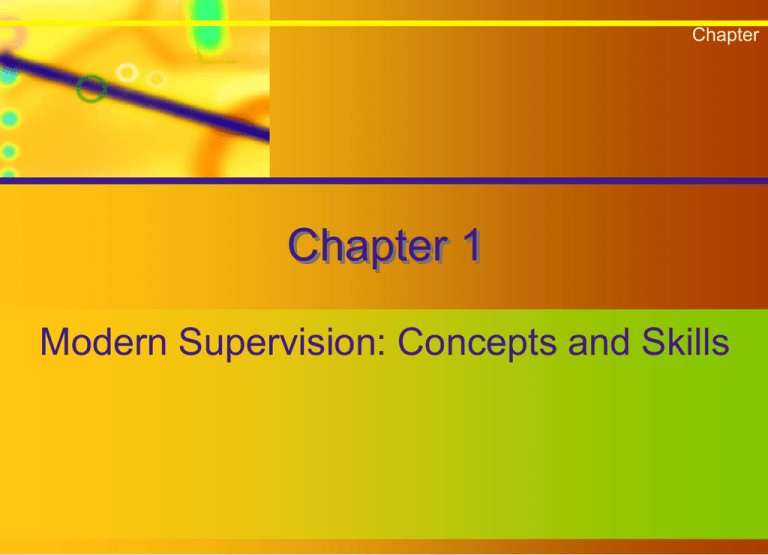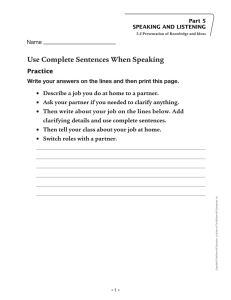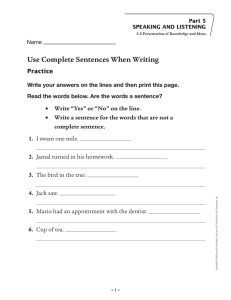
Chapter
Chapter 1
Modern Supervision: Concepts and Skills
What is a Supervisor?
4 Types of Supervisory Skills
1)
Technical-any work related special
knowledge or skill
2) Human relations-more than the ability to
“get along”. Must also inspire workers, defuse
conflicts.
3) Conceptual-how does my dept affect the
whole company? How do each of my
employees affect my dept?
4) Decision making-get the info, analyze it,
and make a decision.
McGraw-Hill/Irwin
1-3
© 2006 The McGraw-Hill Companies, Inc. All rights reserved.
How Important Are These Skills for a
Supervisor?
McGraw-Hill/Irwin
1-4
© 2006 The McGraw-Hill Companies, Inc. All rights reserved.
Supervising a Diverse Workforce
Opportunities
and challenges
Current
trends enable supervisors to draw on a
greater variety of talent and gain insights into a
greater variety of perspectives than ever before.
The even greater diversity expected in the U.S.
workforce of the future requires supervisors to work
successfully with a much wider variety of people.
Subtle
discrimination
Subtle
forms of discrimination persist in every
workplace, and everybody holds some stereotypes that
consciously or unconsciously influence their behavior.
McGraw-Hill/Irwin
1-5
© 2006 The McGraw-Hill Companies, Inc. All rights reserved.
5 Functions of the Supervisor
McGraw-Hill/Irwin
1-6
© 2006 The McGraw-Hill Companies, Inc. All rights reserved.
Planning
It
is the supervisor’s job to determine the
department goals and the ways to meet
them.
Organizational goals are decided by top
managers.
Supervisors determine how their department
can help the company achieve its goals.
McGraw-Hill/Irwin
1-7
© 2006 The McGraw-Hill Companies, Inc. All rights reserved.
Organizing
If
Planning is the what (what do we need to
accomplish?) then Organizing is the how.
How
to set up the group to do the work?
How to allocate resources that the group will
need?
How to assign work to achieve the goals
efficiently?
Usually
involves scheduling and assigning
duties (delegating) to employees.
McGraw-Hill/Irwin
1-8
© 2006 The McGraw-Hill Companies, Inc. All rights reserved.
Staffing
Staffing
is:
identifying,
hiring,
and
developing the necessary number and quality
of employees to do the work planned.
Staffing
is crucial to the supervisor’s successbecause his or her performance depends on
the quality of results that are achieved
through these employees.
McGraw-Hill/Irwin
1-9
© 2006 The McGraw-Hill Companies, Inc. All rights reserved.
Leading
The
supervisor needs to let employees know
what is expected of them
And must inspire and motivate them to do
good work.
Influencing employees to act (or not act) in a
certain way is leading.
McGraw-Hill/Irwin
1-10
© 2006 The McGraw-Hill Companies, Inc. All rights reserved.
Controlling
Monitoring
performance and making needed
corrections is controlling.
In many organizations, the supervisor is still
responsible for controlling, but may not
dictate solutions to the employees. Instead,
the supervisor will give the employee the
resources and motivation to come up with a
solution on their own.
McGraw-Hill/Irwin
1-11
© 2006 The McGraw-Hill Companies, Inc. All rights reserved.
Relationships Among the Functions
Usually
planning comes first, followed by
organizing, then staffing, then leading,
and, finally, controlling. This order occurs
because each function depends on the
preceding function or functions.
Typically, supervisors spend most of their
time leading and controlling because
they’re working directly with employees who
make products or provide services.
McGraw-Hill/Irwin
1-12
© 2006 The McGraw-Hill Companies, Inc. All rights reserved.
Supervisor Responsibilities
Carry
out the duties assigned to them by
higher-level managers
Give
managers timely and accurate information for
planning
Keep
managers informed about your
department’s performance
Cooperate with co-workers in other
departments
Be the “Bridge” between employees and
upper managers
McGraw-Hill/Irwin
1-13
© 2006 The McGraw-Hill Companies, Inc. All rights reserved.
Responsibilities and Accountability
Whatever
the responsibilities of a particular
supervisor, the organization holds that
supervisor accountable for carrying them out.
Accountability
refers to the practice of
imposing penalties for failing to adequately
carry out responsibilities, and giving
rewards for meeting those responsibilities.
McGraw-Hill/Irwin
1-14
© 2006 The McGraw-Hill Companies, Inc. All rights reserved.
Becoming a Supervisor
Typical candidates to be made supervisors:
An
employee with a superior grasp of the
technical skills needed to perform well in
the department.
A person with the most seniority.
An employee with good work habits and
leadership skills.
Recent college graduates.
McGraw-Hill/Irwin
1-15
© 2006 The McGraw-Hill Companies, Inc. All rights reserved.
Keep In Mind…
When
you are promoted from a nonmanagement
employee position to a supervisor position, you will
be viewed differently by your former peers. You are
now “management” and embody many of the
negative perceptions of management that employees
will sometimes have.
Use your human relation skills to build trust and
respect among your former employees. This will be
critical to your success as a supervisor.
Preparing for the Job
Learn
about management through books
and observation.
Learn as much as possible about the
organization, the department, and the job.
Once on the job, continue the learning
process.
Acknowledge another person’s feelings if
they were also a candidate for the position.
Great tips on pg 16.
McGraw-Hill/Irwin
1-17
© 2006 The McGraw-Hill Companies, Inc. All rights reserved.
Obtaining and Using Power and Authority
Power-the
ability to do certain things.
Authority-the right to do certain things.
To acquire power, ask your boss to make an
official announcement of the promotion at a
meeting.
At the meeting, state your expectations, your
desire to work with the team, and your interest in
hearing about work-related problems.
Don’t rush to make changes in the department.
Introduce them gradually.
McGraw-Hill/Irwin
1-18
© 2006 The McGraw-Hill Companies, Inc. All rights reserved.
Characteristics of a Successful Supervisor
McGraw-Hill/Irwin
1-19
© 2006 The McGraw-Hill Companies, Inc. All rights reserved.
Observe A Supervisor
By
next class period, pick a supervisor at your job or
a former job, or at a business you’re familiar with,
and observe that supervisor’s behavior with
customers, fellow supervisors, employees, etc.
Observe that supervisor for the duration of this
course. Interview them about “supervision” and their
role with their company if you have the chance.
By the end of the course, be able to answer these
questions about that supervisor:
.
(continued…)
Have
you observed them doing planning, organizing,
leading or controlling functions? Give examples.
Do they have a different way of communicating when
they talk to an employee compared to an upper level
manager or a customer? Please describe the
differences if any and give examples.
Did you observe them “disciplining” an employee or
resolving a conflict between employees or an
unhappy customer? Was the supervisor successful?
Did you observe him/her using any of the following
skills?
(continued….)
Technical
skills, human relations skills, conceptual skills,
decision-making skills? Please give examples.
Did you observe the supervisor interacting with
employees who are minorities or female or of an older
age? What took place? Do you feel the supervisor
showed any subtle discrimination?
Did you observe the supervisor interacting with his or her
boss? Describe what happened?
What special characteristics of this supervisor make him a
good supervisor in your opinion? What characteristics are
holding him or her back from being a better one?



